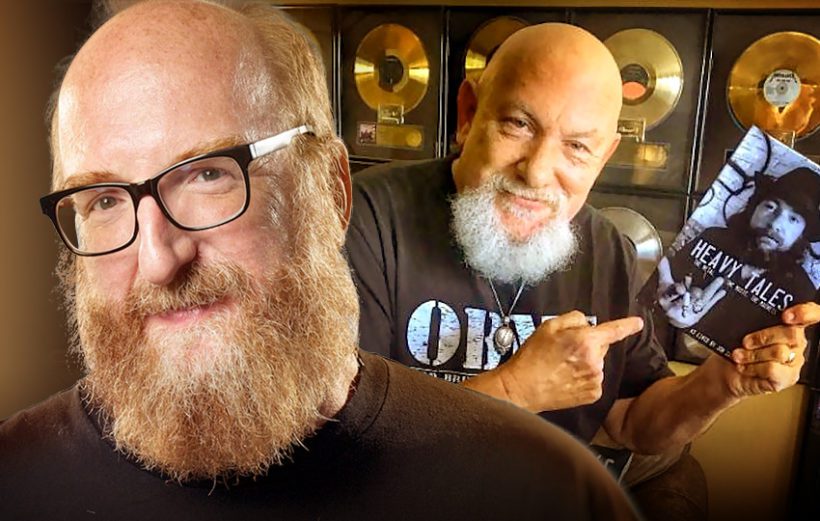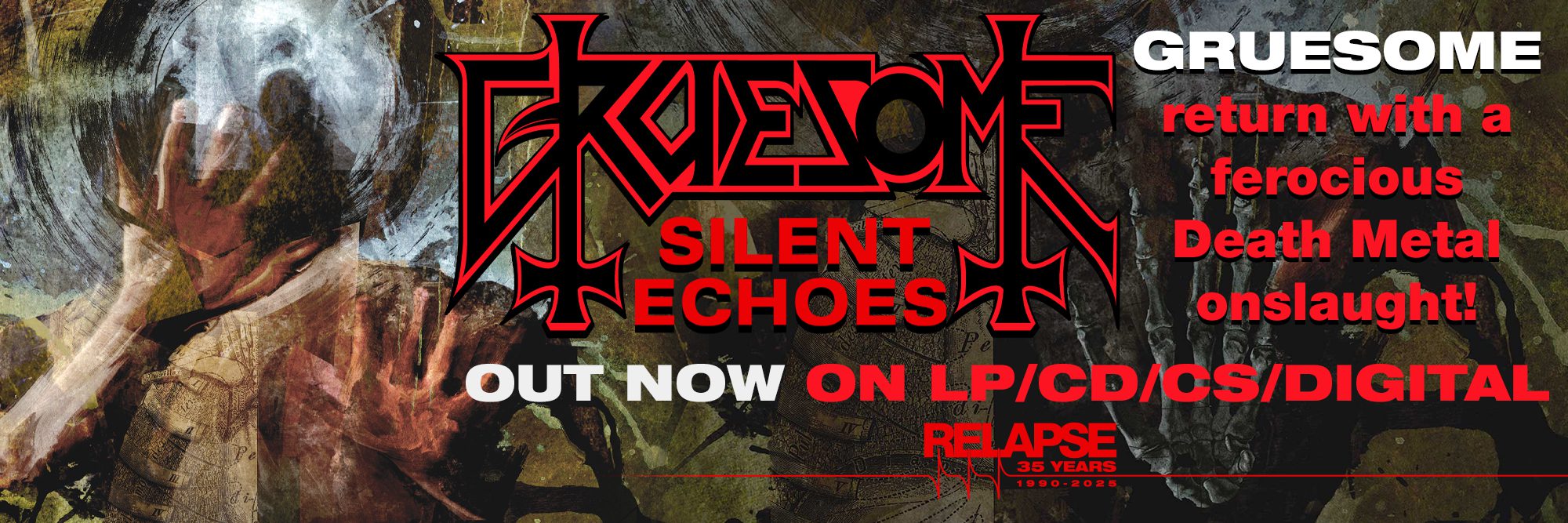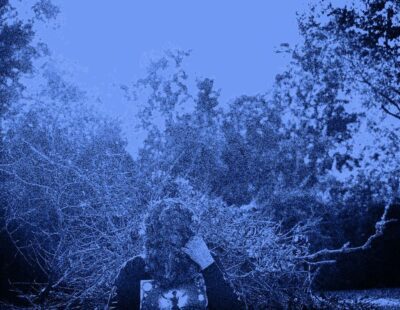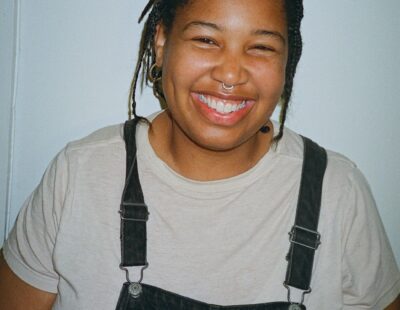
Jon Zazula, better known to the metal-loving public as Jonny Z, is a critical figure to metal’s early development. As the founder of Megaforce Records with wife Marsha and the man responsible for putting Kill ‘Em All into the world, Zazula has worked with a veritable who’s who of heavy metal and released more than a few essential works. He was there at the beginning with Metallica, Anthrax, Testament, Raven and Ministry, with stories to prove it. He dedicates plenty of space to those days in his book, Heavy Tales: The Metal. The Music. The Madness., but Decibel was able to sit in on a conversation between Jonny Z and comedian, musician, actor, TV writer and lifelong metal fan Brian Posehn (Metalocalypse, The Big Bang Theory) to take a quick joy ride through Zazula’s career.
Heavy Tales is available now through Zazula’s site. Posehn’s new album Grandpa Metal came out in February and features members of many of the bands mentioned in this interview.
Brian Posehn: While you were soliciting Metallica for a label deal, what was that like? At what point did you think that Metallica was going to take off? Was there an “Oh, shit” moment like this was going to blow up?
Jon Zazula: Brian, I had the epiphany and the vision the second I heard the demo tape. That demo tape hit me like a bolt of lightning and it caused me to run out and leave my store behind, go to a payphone outside of the building because there were of course no cell phones at the time and I couldn’t afford in my booth to even have a phone. I went to a payphone outside to call the name on the tape, AJ Gordon, to try to get me together with this band.
Posehn: What was it like actually taking them out for a record deal? Were people into it right away or were people turning you down?
Zazula: Everybody turned us down. The hiding under the desk story, though, is an Anthrax story. I was shopping Fistful of Metal for Anthrax. A very renowned A&R rep couldn’t handle the frequencies, put his hands over his ears, went under the desk and asked me to please turn it off because he couldn’t reach over and put his hands on the turntable.
Posehn: While managing Ministry during their well-documented drug-filled days, what were the craziest times you spent with Al [Al Jourgensen] and Paul [Barker]? The craziest, what’s your first big memory?
Zazula: Paul was always a pillar and always there to communicate and be level-headed. Al is fuel-injected, truly, I think, an icon. Working with Al for five years, Brian, I’ve seen a lot. I talk about it very little in the book and in my life because I think a lot of it’s between Al and me. I didn’t want to get into glorifying drugs and madness. A lot of people do that in rock and roll books, I basically just wanted to tell the story of how it happened in seven days—the earth was created and we called it Megaforce in those days. That’s the story I wanted to tell.
Posehn: I heard it was tough even getting Ministry to play Lollapalooza. Why was that?
Zazula: Al has a lot of integrity when it comes to a show and what he wants to give the public. He really likes to develop shows that are in the dark with screened film footage.
Posehn: He didn’t want to play at 3 in the afternoon.
Zazula: He didn’t want to play a picnic. That’s what he called Lollapalooza and everything. They respected Al very much. We got a very good offer and the album was really doing well, Psalm 69, and everybody was really jacked up on Ministry and Al comes up to me with the farmer’s almanac in his hand and tells me what time it turns dark in every city of the Lollapooza tour and he tells me, “Put that into my request list. I want to go on at this time before the Chili Peppers.”
From what I remember, he got his spots.
Posehn: He got the spots he wanted.
Zazula: He got the spots he wanted. We played, it started a little light but it got dark by the end.
Posehn: Obviously the music business was very different those days but what kind of budgets did you get for albums and videos for some of your biggest clients like Anthrax and Metallica and Ace Frehley?
Zazula: I don’t like to talk about deals and things like that, but certain bands did get as much as a half million. Sometimes more because what happened in the old days, they really used to take advantage of me with like $25,000, $50,000, $100,000 budgets. You were expected to do a lot of things with that hundred. It wasn’t just putting an album, it was the radio, the marketing, the development, everything you could imagine was in that money. It may look appealing but it went very fast.
Even when Anthrax got a big budget, it required a lot of marketing and great stuff to be done for the album all over the world. All this marketing and everything costs money. It wasn’t just Anthrax. It was every band—Megadeth, which wasn’t mine, but it all cost a lot money.
Posehn: One of my favorite bands of that era, one of yours actually, is Testament. Did you want to sign them right away?
Zazula: Hell no.
Posehn: Did you hear The Legacy or did you hear a demo, what did you hear?
Zazula: It was a demo. Legacy was the band’s name at the time, it was a demo. It sounded too much like “I want to be Metallica” to me with the frequencies that were going on in my head at the time. My ears hear certain things in a certain way and it locks in. That’s why later on Megaforce became a non-metal label. I couldn’t do the same metal over and over again.
Posehn: So did it take somebody at the label?
Zazula: We had a secret weapon at Megaforce Records. Her name was Metal Maria. Great, great ears. I think I have great, great ears, I think Metal Maria has great, great ears, I think Marsha [Zazula] has great, great ears. Between the three ears, that’s a lot of bouncing off each other that really worked out. I didn’t want it and she insisted and she bit my ass off and she beat the hell out of me and then they switched singers.
This newer guy Chuck Billy became the singer and I liked his voice. I thought the music made a little more sense to me and it sounded a little different. I started to get more into their guitar work, the [Eric] Peterson and [Alex] Skolnick combination, and it just started to make sense to me. We went to San Francisco to hang out with the band. We got there and unfortunately it was the day that Cliff Burton passed. That’s how we walked into the studio, to see Testament with Chuck Billy perform, rattled. Literally rattled, not even twelve hours passed. We had walked in to see this band Testament, or Legacy, with Chuck Billy.
The only thing that was redeeming about that event was that they were amazing.
Posehn: Looking back, how do you feel about the impact your fledgling record company made on the world and on music as a whole?
Zazula: I felt very positive about what we were doing. It felt more like a movement than a company development. I felt kind of weird. I felt like I was an important part of something that was going to change the world. Metal is an attitude, it’s a way of life, it’s a special, special kind of music. I like that.
Posehn: Tell me about meeting Metallica for the first time.
Zazula: I lived in a residential neighborhood that was not pro-the crowd that hung out at my house. The grass was always twelve or more inches high in the front and beer cans in trees and the lawn like it was Christmas ornaments. In front of that house comes a U-Haul truck and out comes the band. When they came to my house, they had a punk attitude. I was trying to define it in my head immediately. It was a real “I don’t care, we’re here.”
Posehn: I’ve seen interviews of those days where they already had that attitude. It’s pretty amazing that they had confidence.
Zazula: They had that attitude the second I saw them and then when they came to my house, I had a little cart, like a little wagon, and on it I had bottles of booze. That was supposed to last me a lifetime, or at least five years.
How quickly did they go through it?
Zazula: The bottles went. There was no such things as cups. It was quite a spectacle and I said “This is unbelievable.” The first thought I had was “What did I get myself into?” but I knew that they were special. You just know it and you can feel it, and I just wanted to be with them and part of it all.
Going back to Anthrax…. did Anthrax kind of go after you or am I getting that story wrong?
Zazula: Anthrax as individuals, as Scott Ian and Dan Lilker go, would show up at shows all the time that I was promoting in the area. They would show up on the weekend at the flea market with demo tapes of their band. I’d take them all, I’d listen to them. I wouldn’t play them in the house the first time I heard a demo because it could be horrible and I don’t want to scare the neighbors away. Every time I would go back to Anthrax, I would say “Look, it needs this, it needs that…” and they came back three, four times to the flea market and I passed every time. Then, finally, they showed up at an International House of Pancakes where I was taking my family with the kids.
They said Ross the Boss produced it, “Soldiers of Metal,” and the B-side was great too. I really flipped and said “You guys may have it here.” If you can do an album of this, we can do something together. And they did, they wrote these great songs and the rest is history. That’s the whole story in itself, Anthrax.
Tell me about the Venom story. You promoted one of their concerts. Did that go well?
Zazula: We brought Venom to America the first time they ever came here, one of the rare times they came here. It was the original Venom. They had a crew of six and a manager, so there were nine or ten of them that I had to fly from Newcastle, England to the United States, New Jersey.
It was really intense. They came with pyro boards, which were basically bomb boards from, like, the IRA in the terrorist days. They had all this stuff, dynamite. How they got it on the plane, I have no idea.
They came with all that and they had to have all the people come because they had to carry all that stuff. When we finally do the show, they took like an extra hour or two to set up because nobody really knew what they were doing with the pyro, it turned out.
They said, “It’s safe, it’s safe, it’s safe.” The show goes on, the first flash pots go off, you see the whole front row of the audience turn black faced. It was soot from the blast pots in their faces. The flashes were used, very exciting, but the next day, I was sitting up in the balcony of the Paramount Theater where the show took place and I found the bottom of a bomb, what holds it down to the stage, I found it all the way up in the balcony. It could’ve taken someone’s head off the way it projected up to the balcony. Not only that, but they blew a hole in the Paramount stage I had to pay for.
When you’re dealing with Satan or his minions, things like that happen.
Zazula: You don’t know what the original Venom, how much darkness surrounds them. When I asked them to write a check to the sound company for all the bass bins they blew up… nine of them, it cost me $666.
Did you have any similar stories with Slayer, the American Satanic metal band of that time?
Zazula: The only thing I can say about Slayer is whenever I passed Slayer, I felt darkness. I saw them their first show when they got big enough to headline L’Amour in Brooklyn. I want to tell you something: the only thing I cared about is “Where’s the exit if this place burns down?”
It was the scariest thing I ever saw. I remember how dark and intense it was, and I’ve seen Slayer 20, 30 times after that. It just got bigger and darker, but in a little club, it was intense, man.
I saw them in the early days and that’s partially why they’re so legendary. They had a real dark vibe at the beginning, man. Tell me about your time at Atlantic Records. How did that happen? How did that time go?
Zazula: I was brought into Atlantic by Larry Yasgar, who had signed Raven to Atlantic. And he said to Doug Morris who was president at the time, “You should check out this dude, he’s got the balls, he’s got good ears. He knows what he’s doing, I think we should invest in him and bring his label over here,” and he did. We really helped establish some great bands at a great time.
While that was going on, Tipper Gore and those crazy Washington housewives were making me put stickers on everything. Overkill came to me to put out an EP called Fuck You with a big finger on the cover. I fought with Atlantic to put it out, I had to put it out independently. Sold a hell of a lot of them. That was my favor to the PMRC.
I finally broke the mold at Atlantic with Ace Frehley and we had quite a hit with “Into the Night,” which was a big song on that album (Frehley’s Comet). We almost sold half a million records with that record and it was quite a success for our album at Atlantic, but then I came with Vio-lence!
Tell me about signing Vio-lence.
Zazula: Vio-lence was very cool. I think they lived in Union City, they had a studio in Union City in the Bay Area. They were in a little U-Haul kind of storage place and I saw them play inside a storage bin. They took my head right off, the original lineup.
My problem was I took them coming off of a bad turn with Mechanic Records and I was starting to run into very heavy resistance at Atlantic.
Because the PMRC?
Zazula: They felt I had a responsibility, fuck the PMRC, to not put out stuff like this on Atlantic Records. And you want to know something? I was also, at that time, having a little bit of a problem with the vocalist trying to say if he could just change a little bit, I think we could really break through in a bigger way. Sean Killian. And great guy, probably a great singer, but I just didn’t hear it. I couldn’t connect with that. It caused a rift at Atlantic, after I made them put out the record, we sold so few, that caused not-great blood.
Let’s talk about the bigger Jon and Marsha story. I understand there’s an amazing story of you and Marsha against the world.
Zazula: That’s what it is. I really took advantage of our relationship to make Megaforce what it is and Marsha never, ever backed away from a challenge. Together, we worked together as partners so intensely it was like one mind. Everything was good, we raised a family together, as a husband and wife. In the book, you’ll see, it’s quite a love story. There’s even a story about how we met and got engaged in the book.
How did you two make it work for all these years between the insanity of your day jobs?
Zazula: Love is a real intense drug and I’m happy that I really, really have been blessed with the ability to feel it and receive it equally, not to mention that I’m always wrong every fight. She’s always right, just remember that, folks. She’s always right.
What’s next? Is anything on the horizon after this book?
Zazula: I don’t know quite yet, Brian. I have to tell you: a lot of people want me to go back to work but I think I’ve lost touch with what’s happening right now in the new progression of movement and I think it’s unfair of me to think I know everything I used to know.
When I was young and I was about nineteen years old, somebody asked me “When you get older, what do you want to do? What would you consider to be success?” and the first thing I said was “To be alive and to be able to smoke all the weed you could ever imagine with the best music playing in the background all day long in the garden in your backyard.” That’s really what it is and it’s a wonderful thing to be in a world where you can do that and not worry.






